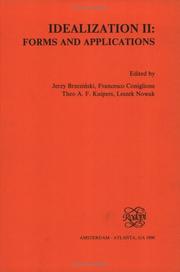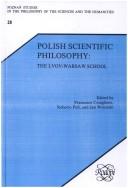| Listing 1 - 8 of 8 |
Sort by
|
Book
ISBN: 3110319632 9783110319637 9783110319217 3110319217 9783868380668 3868380663 Year: 2010 Publisher: Frankfurt Ontos Verlag
Abstract | Keywords | Export | Availability | Bookmark
 Loading...
Loading...Choose an application
- Reference Manager
- EndNote
- RefWorks (Direct export to RefWorks)
Is the objective that the European Union set itself in 2000, that is, to be «the most competitive knowledge-based society and economy» by 2010 still realistic? The momentous year has arrived, but it is discouraging to note that very few steps have been made in the direction that was fixed. What has gone wrong? Were the philosophical, epistemological and economic conditions adequate to achieve the desired result? This book - the result of a research project commissioned by the European Commission - critically investigates the society of knowledge and the way in which the European Union has proceeded towards it, examining first of all the premises and the contributions that the disciplines of Science and Technological Studies can provide. In this way, we have proposed innovative theoretical and epistemological bases for a multidisciplinary approach - making use of the Modelling Approach to Science - and therefore insisting on the function that human sciences can have for a society of knowledge that hinges not so much on an industrialist scenario, but a humanist one that eschews hyper-specialization and instead privileges creativity, flexibility, imagination and innovation economy.
Learning and scholarship --- Science --- Knowledge, Sociology of. --- Knowledge management --- Information society --- Management of knowledge assets --- Management --- Information technology --- Intellectual capital --- Organizational learning --- Knowledge, Theory of (Sociology) --- Sociology of knowledge --- Communication --- Knowledge, Theory of --- Public opinion --- Sociology --- Social epistemology --- Natural science --- Natural sciences --- Science of science --- Sciences --- Erudition --- Scholarship --- Civilization --- Intellectual life --- Education --- Research --- Scholars --- Social aspects --- Political philosophy. Social philosophy --- Theory of knowledge --- Philosophy of science --- European Union
Book
Year: 1993 Publisher: Amsterdam : Rodopi,
Abstract | Keywords | Export | Availability | Bookmark
 Loading...
Loading...Choose an application
- Reference Manager
- EndNote
- RefWorks (Direct export to RefWorks)
Digital
ISBN: 9783110319637 9783110319217 Year: 2013 Publisher: Berlin ;; Boston De Gruyter
Abstract | Keywords | Export | Availability | Bookmark
 Loading...
Loading...Choose an application
- Reference Manager
- EndNote
- RefWorks (Direct export to RefWorks)

ISBN: 9051831544 Year: 1990 Volume: II vol *2 Publisher: Atlanta Amsterdam Rodopi
Abstract | Keywords | Export | Availability | Bookmark
 Loading...
Loading...Choose an application
- Reference Manager
- EndNote
- RefWorks (Direct export to RefWorks)
Science --- -Science --- -Natural science --- Science of science --- Sciences --- Philosophy --- Methodology --- -Philosophy --- Normal science --- Philosophy of science --- Scientific method --- Logic, Symbolic and mathematical
Book
ISBN: 9783896657138 Year: 2017 Publisher: Sankt Augustin Academia
Abstract | Keywords | Export | Availability | Bookmark
 Loading...
Loading...Choose an application
- Reference Manager
- EndNote
- RefWorks (Direct export to RefWorks)

ISBN: 9051835086 Year: 1993 Volume: 28 Publisher: Amsterdam : Rodopi,
Abstract | Keywords | Export | Availability | Bookmark
 Loading...
Loading...Choose an application
- Reference Manager
- EndNote
- RefWorks (Direct export to RefWorks)
Philosophy, Polish --- Analysis (Philosophy) --- Semiotics --- Lvov-Warsaw school of philosophy --- Science --- Philosophie polonaise --- Philosophie analytique --- Sémiotique --- Ecole de Lvov-Varsovie --- Sciences --- Philosophy --- Philosophie --- Sémiotique

ISBN: 9004457275 9051835086 Year: 1993 Publisher: Amsterdam : BRILL,
Abstract | Keywords | Export | Availability | Bookmark
 Loading...
Loading...Choose an application
- Reference Manager
- EndNote
- RefWorks (Direct export to RefWorks)
One can often encounter an opinion that Polish scientific (or analytic) philosophy (or the Lvov-Warsaw School) deserves to be much better known than actually is. This book is thought as a response to such a claim. The papers collected in this volume are divided into two parts: Background and Influence and History and Systematics. However, there is no sharp borderline between themes which are touched in both parts. Generally speaking, all papers of the first part relate the Lvov-Warsaw School to some philosophical movements (Brentanism, phenomenology and Marxism) external to it whereas the papers collected in the second one focus on internal issues connected with the school (only Roberto Poli takes into account Brentano's views in his discussion of reism). Since the Polish school of mathematical logic is much better known than the Polish analytic philosophy we decided to omit here any treatment of the former. Thus, this collection centers on purely philosophical matters. We projected this volume not as an exhaustive panorama of Polish analytic philosophy but rather as a series of essays on particular persons or topic. As a result one can find here papers on Twardowski. Ajdukiewicz, Kotarbinski, Tarski and Lukasiewicz as well as on ethics on science, nominalism, and the methodology of psychology. We hope that this book will contribute to a better knowledge and evaluation of Polish achievements in analytic philosophy. We would like to express our gratitude to Professor Leszek Nowak, the editor-in-chief of Poznan Studies in the Philosophy of the Sciences and the Humanities, who initiated the idea of the collection and helped in its preparation.

ISBN: 9004333215 9789004333215 9042016027 9789042016026 Year: 2004
Abstract | Keywords | Export | Availability | Bookmark
 Loading...
Loading...Choose an application
- Reference Manager
- EndNote
- RefWorks (Direct export to RefWorks)
Discussions about abstraction are so important and so profound that this topic can hardly be neglected. It has inevitably cropped up again in various periods of philosophical enquiry. Despite these ancient roots and after the great debate that characterised the empirical and rationalistic tradition, interest in the problem has unfortunately been absent in large measure from the mainstream of mathematical logic and analytic philosophy. It seems that there is a gap between the epistemological theorization, in which it is difficult to find new insights on the problem of abstraction, and the historical studies concerning the development of philosophical thought. Such studies, however, present a more fertile ground for such insights. Here the reader will find presented for the first time a collection of papers about the topic, considered from an historical point of view together with an awareness of the need for building a bridge between historical research and theoretical speculation. Accordingly the volume consists of both general overviews which sketch the signifcance and the fortunes of abstraction in science, philosophy and logic (the first part) and historical case studies which focus on abstraction in particular thinkers (the second part). This volume is of interest for both general philosophers and historians of philosophy.
Abstraction. --- Ideals (Philosophy) --- Knowledge, Theory of. --- Logic. --- Argumentation --- Deduction (Logic) --- Deductive logic --- Dialectic (Logic) --- Logic, Deductive --- Intellect --- Philosophy --- Psychology --- Science --- Reasoning --- Thought and thinking --- Epistemology --- Theory of knowledge --- Abstract thought --- Cognition --- Logic --- Methodology --- Abstraction --- Knowledge [Theory of ]
| Listing 1 - 8 of 8 |
Sort by
|

 Search
Search Feedback
Feedback About UniCat
About UniCat  Help
Help News
News